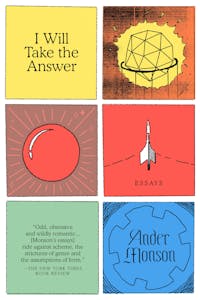I Will Take the Answer
Essays
 Download image
Download image
ISBN10: 1644450119
ISBN13: 9781644450116
Paperback
224 Pages
$16.00
CA$21.00
The idea of connection permeates I Will Take the Answer, Ander Monson’s fourth book of utterly original and intelligent essays. How is our present connected to our past and future? How do neural connections form memories, and why do we recall them when we do? And how do we connect with one another in meaningful ways across time and space?
In the opening essay, which extends across the book in brief subsequent pieces, a trip through a storm sewer in Tucson inspires Monson to trace the city’s relationship to Jared Lee Loughner, the gunman who shot Gabrielle Giffords and killed six bystanders, along with how violence is produced and how we grieve and honor the dead. With the formally inventive “I in River,” he ruminates on water in a waterless city and the structures we use to attempt to contain and control it. Monson also visits the exuberantly nerdy kingdom of a Renaissance Faire, and elaborates on the enduring appeal of sad songs through the lens of March Sadness, an online competition that he cofounded, an engaging riff on the NCAA basketball tournament brackets in which sad songs replace teams.
As personal and idiosyncratic as the best mixtape, I Will Take the Answer showcases Monson’s deep thinking and broad-ranging interests, his sly wit, his soft spot for heavy metal, and his ability to tunnel deeply into the odd and revealing, sometimes subterranean, worlds of American life.
Reviews
Praise for I Will Take the Answer
"The theme of most of these pieces is tragedy in all its forms, from mass shootings and mining disasters to floods and tsunamis. Even when his topic is as seemingly frivolous as the Arizona Renaissance Festival, tragedy and loss are never far from his thoughts, as when he notes that fairs, like video games and other diversions, are a way 'to forget about yourself for a little while' . . . However, the best essays start in one place and move in unpredictable, satisfying directions, as when a piece on mixtapes given to him by friends leads him to ask a question that is especially moving given the collection’s emphasis on loss: 'What do we leave the world? What marks do we leave in snow among the trees? What magnetic trace do we erase or tape over?'"—Kirkus Reviews

